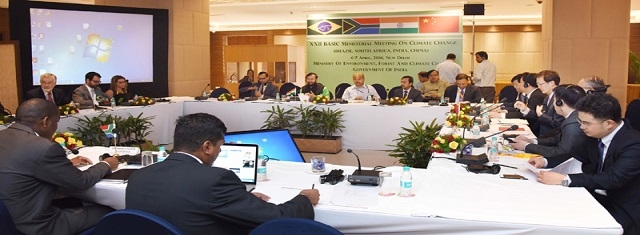News
South asia wildlife enforcement network
To Strengthen Relations

BASIC Ministerial Meeting (Source: PIB/GR/TYP/BIN/USPA/WN/IAIJ)
USPA NEWS -
The Minister of Environment, Mr. Prakash Javadekar addressing a press conference on the 22nd BASIC Ministerial Meeting on Climate Change, in New Delhi on April 07, 2016.
To Strengthen Ties With The Member Countries In Controlling The Trans-Boundary Wildlife Crime
To Strengthen Ties With The Member Countries In Controlling The Trans-Boundary Wildlife Crime
The Union Cabinet chaired by the Prime Minister Mr. Narendra Modi has given its approval for India adopting the Statute of the South Asia Wildlife Enforcement Network (SAWEN) and India and becoming its formal member in order to strengthen ties with the member countries in controlling the trans-boundary wildlife crime through communication, coordination, collaboration, capacity building and cooperation in the region.
SAWEN, a Regional network is comprised of eight countries in South Asia: Afghanistan, Bangladesh, Bhutan, India, Maldives, Nepal, Pakistan and Sri Lanka. It aims at working as a strong regional inter¬governmental body for combating wildlife crime by attempting common goals and approaches for combating illegal trade in the region.
Adoption of SAWEN statute envisions India being part of the regional inter¬governmental body in combating wildlife crime in the region and beyond.
----------------------------------------------------------------------------------------------------------------------------------------------------------------
Adoption of SAWEN statute envisions India being part of the regional inter¬governmental body in combating wildlife crime in the region and beyond.
----------------------------------------------------------------------------------------------------------------------------------------------------------------
Doruvu Paul Jagan Babu New Delhi India Prime Minister Narendra Modi Ministry Of Environment Sawen Prakash Javadekar
Liability for this article lies with the author, who also holds the copyright. Editorial content from USPA may be quoted on other websites as long as the quote comprises no more than 5% of the entire text, is marked as such and the source is named (via hyperlink).





